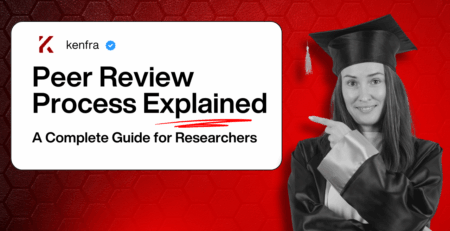What is a PhD Thesis and Why’s It So Hard?
Kenfra Research - Shallo2025-04-15T09:31:14+05:30If you’ve ever considered pursuing a PhD or have spoken to someone who has, you’ve probably heard stories about the daunting challenge of writing a PhD thesis. But what is a PhD thesis exactly, and why do so many doctoral students find it difficult? In this blog post, we’ll break down the concept of what is a PhD thesis, explain its importance in academia, and uncover the main reasons why it’s considered one of the most challenging academic tasks anyone can undertake.
Whether you’re a prospective PhD student, a curious reader, or someone already on the PhD journey, this post will give you valuable insights into what makes a PhD thesis so hard—and how to overcome those difficulties.

What is a PhD Thesis?
A PhD thesis—also called a doctoral dissertation in some countries—is an extensive, original piece of research that a student must complete as part of earning a Doctor of Philosophy (PhD) degree. It is not just a long academic essay; it is a document that presents the student’s independent research, provides a deep review of the existing literature, and contributes new knowledge or theories to their field.
Key Elements of a PhD Thesis
- Original Research: The core requirement is that the work must be original and make a significant contribution to the academic field.
- Comprehensive Literature Review: The student must survey and analyze existing research to show how their work fits into the broader academic conversation.
- Methodology: A detailed explanation of how the research was conducted, including data collection and analysis methods.
- Results and Discussion: The presentation and interpretation of the research findings.
- Conclusion and Future Work: A summary of the key insights and suggestions for future research directions.
A typical PhD thesis can range from 50,000 to 100,000 words, depending on the discipline and university requirements.
Why Is a PhD Thesis So Hard?
Now that you understand what a PhD thesis is, let’s dive into the reasons why writing one is such a formidable challenge.
- It Requires Original Thinking
The foundation of a PhD thesis is originality. Unlike a master’s dissertation or undergraduate paper, you’re not simply summarizing existing knowledge—you must add something new. That means identifying gaps in existing research, asking new questions, developing theories, or applying methodologies in a novel way. It’s intellectually demanding because you’re expected to produce something no one else in the world has done before.
- Time Commitment and Longevity
A typical PhD program can last between 3 to 6 years, with most of that time devoted to planning, conducting, and writing up the thesis. This long-term commitment requires sustained motivation, discipline, and time management skills.
The challenge is not just the length but the need to maintain momentum over such a long period, often while juggling teaching responsibilities, publications, or even part-time jobs.
- High Academic Standards
The level of scrutiny that a PhD thesis undergoes is intense. It must meet rigorous academic standards and is typically reviewed by multiple experts during a viva voce (oral defense). Any errors in methodology, logic, or referencing can lead to revisions—or worse, rejection.
In short, there is very little room for error. This pressure can be overwhelming, especially for students who are perfectionists.
- Lack of Clear Structure and Guidance
Unlike coursework, where assignments come with clear instructions and deadlines, PhD research is largely self-directed. While students have supervisors, the responsibility of setting goals, maintaining timelines, and solving problems rests primarily on their shoulders.
This autonomy can be liberating but also disorienting, particularly for students who are used to more structured learning environments.
- Mental and Emotional Challenges
Writing a PhD thesis is not just a test of academic skill—it’s also a mental and emotional marathon. Many students struggle with imposter syndrome, burnout, anxiety, and self-doubt. The isolation that often accompanies solo research work only intensifies these issues.
Support systems, time off, and mental health resources are essential—but unfortunately, not always available.
- Revisions and Feedback Loops
Rarely is a PhD thesis accepted as-is. Most students go through multiple rounds of feedback and revision, sometimes taking months or even years to finalize the document. Supervisors, peer reviewers, and external examiners often ask for substantial changes.
Tips to Tackle the PhD Thesis Challenge
Now that we’ve covered the difficulties, let’s end with some actionable tips to help you navigate the PhD thesis journey more smoothly:
- Start Early with a Solid Plan: Break down the thesis into chapters and set milestones.
- Maintain a Research Journal: Document ideas, breakthroughs, challenges, and references.
- Use Project Management Tools: Tools like Notion, Trello, or even Google Calendar can help you stay organized.
- Seek Support: Join PhD support groups, academic writing circles, or online communities.
- Take Breaks: Avoid burnout by scheduling time off and hobbies.
- Use Academic Resources: Reference management software (Zotero, Mendeley), plagiarism checkers, and style guides can streamline the process.
- Communicate with Your Supervisor: Regular updates and feedback sessions are crucial.
- Don’t Strive for Perfection: Aim for progress. A good thesis is a finished thesis.
Conclusion
Writing a PhD thesis is one of the most challenging yet rewarding academic tasks. It demands originality, persistence, deep critical thinking, and emotional resilience. But with the right mindset, support system, and strategies, you can conquer the mountain that is the PhD thesis. What is a PhD thesis if not a true test of your academic and personal growth? Whether you’re just starting your PhD journey or are stuck halfway through your writing, remember—you’re not alone. Every PhD scholar has struggled at some point, and understanding what is a PhD thesis really about can give you the clarity and motivation to push through. Pushing through those tough phases is what makes the final victory so meaningful.
Kenfra Research understands the challenges faced by PhD scholars and offers tailored solutions to support your academic goals. From topic selection to advanced plagiarism checking.









Leave a Reply